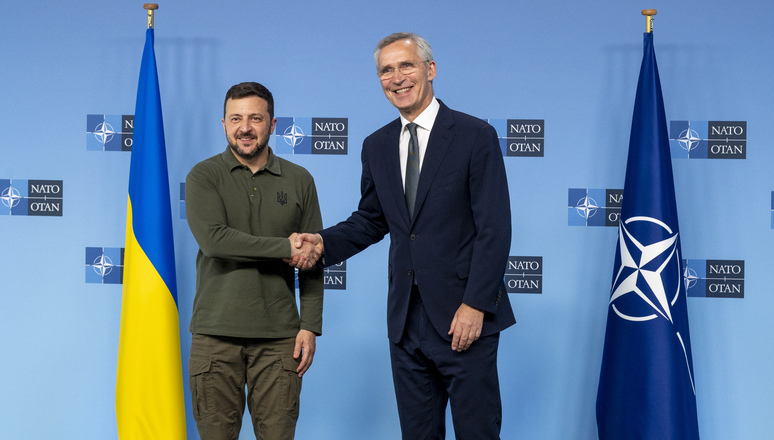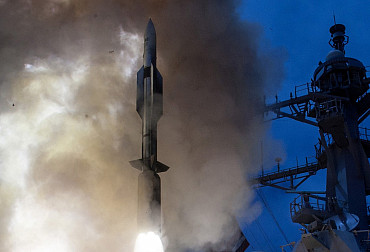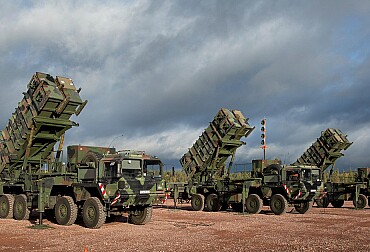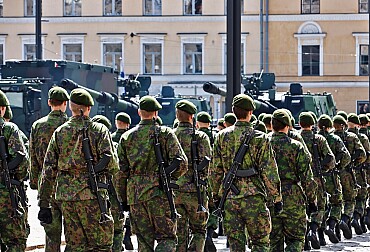No turning back? NATO asserts Ukraine on ‘Irreversible Path’ to membership
In a highly anticipated declaration at the 2024 NATO Summit in Washington, the alliance reaffirmed Ukraine's trajectory towards full membership, marking a significant moment in Euro-Atlantic security dynamics. The summit's communique underscored that Ukraine is on an “irreversible path” to NATO membership, emphasizing Kyiv's progress in implementing essential democratic, economic, and security reforms. Although the declaration fell short of extending a formal membership invitation, it sent a strong signal about NATO's commitment to Ukraine's future.

Support for Ukraine's sovereignty
The declaration from the summit made a bold statement: “We fully support Ukraine’s right to choose its own security arrangements and decide its own future, free from outside interference. Ukraine’s future is in NATO.” This statement solidifies NATO's stance on Ukraine's sovereignty and right to self-determination, free from external pressures, particularly from Russia.
Concrete progress and continued support
NATO acknowledged the substantial strides Ukraine has made since the Vilnius Summit in enacting necessary reforms. These reforms are pivotal for Ukraine's integration into NATO and the broader Euro-Atlantic community. The alliance expressed its readiness to extend an invitation to Ukraine once all allies agree and the required conditions are met, establishing a "bridge to Ukraine’s membership in NATO."
Language and commitment
The careful crafting of the summit's declaration, particularly the term “irreversible,” reflects the alliance's intention to provide Ukraine with a clear and robust message about its place in NATO. Estonian Defense Minister Hanno Pevkur emphasized the importance of delivering a strong message to Ukraine. This sentiment was echoed by several leaders, including NATO Secretary General Jens Stoltenberg and Lithuanian President Gitanas Nausėda, who reinforced the use of "irreversible" to describe Ukraine's NATO trajectory.
Financial and military support
As part of its ongoing support, NATO pledged €40 billion ($43.3 billion) in security assistance to Ukraine over the next year. This assistance is deemed the "minimum" required to support Ukraine's defense efforts. Additionally, NATO will consolidate various members' security assistance initiatives into a new headquarters-level organization, led by a three-star general and based in Germany, with an estimated 700 personnel dedicated to the task.
Commitment to ending the war
Stoltenberg stressed the importance of demonstrating commitment and resolve to avoid a forced peace that would merely result in occupation. “We want to end the war as soon as possible. The quickest way to end the war is to lose the war, but that would not bring peace. It would only bring occupation,” he stated. This underscores NATO's strategy of steadfast support to ensure Ukraine does not succumb to Russian aggression.
Ukraine's urgency and NATO's response
Ukrainian President Volodymyr Zelenskyy underscored the urgency for more aid from NATO, highlighting the critical nature of strong decisions during the summit. Zelenskyy's call to action reflects the ongoing challenges Ukraine faces amid the war and its reliance on NATO's continued support for security and stability.
NATO's stance on Russia and global security
The summit's declaration also addressed the broader security landscape, identifying Russia's full-scale invasion of Ukraine as a direct threat to Euro-Atlantic stability. It described Russia as the most significant threat to allies' security and terrorism as the most direct asymmetric threat to international peace and prosperity. The juxtaposition of Russia and terrorism in the declaration signals NATO's growing concern over Russia's hybrid activities, including cyberattacks and vandalism in NATO countries.
The China factor
Beyond the immediate focus on Ukraine, the summit also highlighted concerns regarding China. NATO and EU leaders planned to meet with delegations from South Korea, Japan, Australia, and New Zealand to discuss China's role in global security. The communique explicitly called out China as a "decisive enabler" of Russia's war against Ukraine, urging Beijing to cease its material and political support for Russia.
Strategic implications
NATO's firm language against China indicates a broader strategic pivot towards the Indo-Pacific region. This shift reflects the alliance's recognition of the interconnected nature of global security threats and the need to address China's actions comprehensively.
Future actions
While Stoltenberg emphasized the importance of the declaration itself, he avoided detailing specific actions NATO might take against China. The focus remains on the collective message that enabling Russia's conflict will negatively impact China's interests and reputation.
Conclusion
The 2024 NATO Summit in Washington marked a pivotal moment for Ukraine's path to NATO membership. The declaration's strong language and significant pledges of support underscore NATO's unwavering commitment to Ukraine's sovereignty and security. As Ukraine continues its reforms and faces ongoing challenges, NATO's strategic decisions and global outlook will play a crucial role in shaping the future of Euro-Atlantic security.








